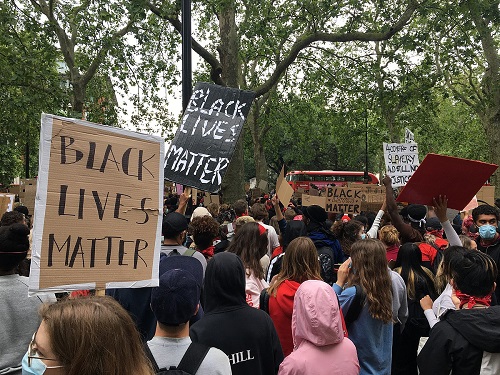Day, S., Silence is not an option. Geoscientist 30 (6), 5, 2020
https://doi.org/doi: 10.1144/geosci2020-090, Download the pdf here
 I’ve been doing a lot of reading over the past few days. As protests against police brutality and racial injustice have swept across the world, so many of us have been wondering what we can do. It’s felt more important than ever to listen, to educate ourselves and try to understand. Reading isn’t nearly enough – it’s barely a beginning – but it’s where I’ve started.
I’ve been doing a lot of reading over the past few days. As protests against police brutality and racial injustice have swept across the world, so many of us have been wondering what we can do. It’s felt more important than ever to listen, to educate ourselves and try to understand. Reading isn’t nearly enough – it’s barely a beginning – but it’s where I’ve started.
I’ve been reading about Marguerite Thomas Williams, the first African American geologist to gain a PhD in the United States. After completing her dissertation, ‘A History of Erosion in the Anacostia Drainage Basin’, in 1942, she was appointed a full professor at Miner Teacher’s College – an institution of learning and training for young African American women. Alongside, she taught night classes at Howard University, an institute whose students regularly protested at local cafeterias that refused to serve them due to their race.
I’ve been reading about the appalling racism, prejudice and links to slavery in the biographies of some of geology’s most famous figures – Louis Agassiz, who commissioned humiliating photographs of Black slaves to support his belief in their inferior biology. Henry De la Beche, a slave owner vocally opposed to abolition. And I’ve been reading about how our science has profited from slavery and colonialism, supporting White scientists, collections and institutions whilst Black lives suffered. Many people have asked what we do about this; how we reconcile these aspects of our science’s history, and honestly, I don’t know. I just know we can’t ignore it.
I’ve been reading people’s testimony of their own experiences of racism in academia, industry and society. #BlackintheIvory, which documents the experience of being Black in academia. #BlackinNature; accounts of Black people feeling unsafe and unwelcome in outside spaces. #BlackinSTEM; people all over the world sharing their stories and offering support. I’ve been reading statistics which paint a bleak picture of diversity in our science and in academia more widely: 10% of UK geology undergraduates are from a Black, Asian or minority ethnic background. Just 2% of UK geology undergraduates are Black, and 1.2% of UKRI studentships are awarded to Black students.
I’ve been reading the numerous messages of support and a commitment to change from universities, institutions and employers and wondering how they will translate into action, hoping that this isn’t both the beginning and the end of the conversation. Others have also been researching and learning: on 10 June, thousands of academics and many organisations stopped work as part of #ShutDownSTEM, a global stand against racism in science designed to give time for reflection and planning. It will be interesting to see what changes emerge in the coming days and months as a result.
Reading is a silent process. It’s not enough, unless we use it to make noise. We need to be loud and unafraid in our outrage. We need to be vocal in our rejection of racism, bias and discrimination, and in our affirmation that Black Lives Matter.
This magazine should be a part of that. If you have thoughts and ideas you’d like to share, we’re listening – whether you want to contribute an article, tell us what you’d like to see more of, or simply share your frustration and your anger.
We stand in solidarity with our Black authors, readers and colleagues. Geoscientist magazine is for everyone, and we know we have a lot of work to do.
Further reading and sources:
You can read more on Marguerite Thomas Williams at https://trowelblazers.com/marguerite-thomas-williams/ For more on Louis Agassiz’s daguerreotypes, and a subsequent lawsuit over their ownership: https://www.nytimes.com/2019/03/20/us/slave-photographs-harvard.html For more on Henry De la Beche’s links to slavery: https://www.ucl.ac.uk/lbs/person/view/2146633718
Data on Higher Education student enrolment by subject and ethnicity is available at https://www.hesa.ac.uk/data-and-analysis/students/table-8
UKRI studentship statistics taken from Leading Routes’ report, ‘The Broken Pipeline’, available at https://leadingroutes.org/launch-the-broken-pipeline-report